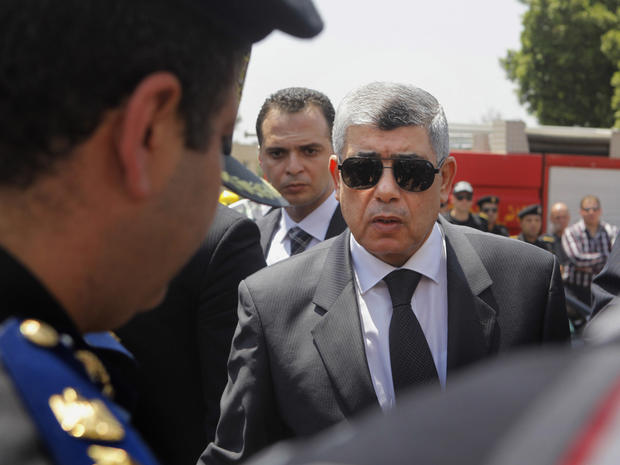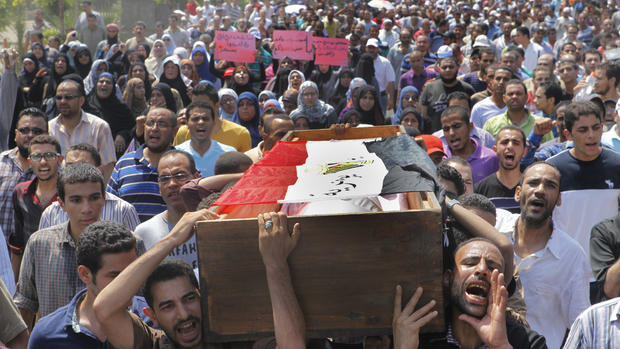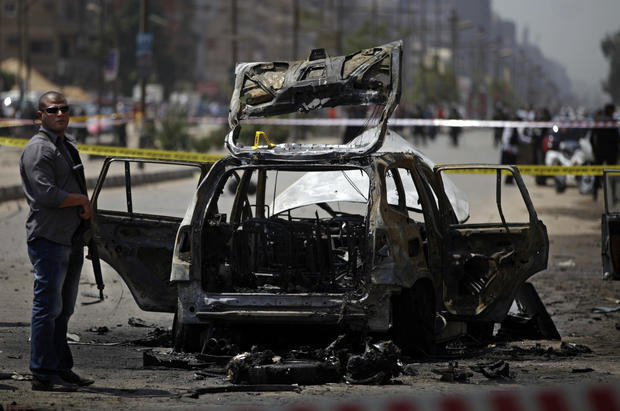Egypt interior minister Mohammed Ibrahim survives apparent assassination attempt
Updated 4:27 PM ET
CAIRO Egypt's interior minister narrowly escaped an assassination attempt Thursday when a suspected car bomb tore through his convoy, wounding 22 people and leaving a major Cairo boulevard strewn with debris -- the first such attack since the military ousted the Islamist president.
The strike, which left several other charred cars and broken building facades, escalates the confrontation between the new leadership and Islamists. It also hiked fears of a militant campaign of revenge for the coup and raised the likelihood of an even tougher hand by authorities against protesters demanding Mohammed Morsi's return to office.
The interim president and other officials immediately compared the attack to the days of the Islamic militant insurgency of the 1980s and 1990s, when radicals battling security forces in the south also attempted numerous assassinations. Militants failed in attempts on the lives of at least four successive interior ministers, the last in 1993, and succeeded in killing the parliament speaker.
The insurgency also provided then-autocratic ruler Hosni Mubarak with one justification for maintaining a state of emergency nationwide for his entire rule, lifted only after he was driven from power by an uprising in 2011.
Since Morsi's ouster in the July 3 coup, Egypt has been back under emergency law, and police have arrested nearly 2,000 members of his Muslim Brotherhood and other Islamist supports.
In mid-August, authorities moved in on two pro-Morsi sit-ins in Cairo after days of warnings, forcefully dispersing the crowd. In the process, hundreds were killed and counter-violence was set in motion, as government buildings, police stations and churches came under attack around the country.
Islamic hard-liners have stepped up attacks on security forces in the Sinai Peninsula and in the south, tried to rocket a ship in the strategic Suez Canal, and have increasingly brought attacks to the capital.
But Thursday's bombing against Mohammed Ibrahim, who heads the police waging the crackdown the past two months, was a substantial escalation.
Interim President Adly Mansour's office vowed in a statement that it would "not allow the terrorism that the Egyptian people crushed in the 1980s and 90s to raise its ugly head again." Military leader Abdel-Fattah el-Sissi, the man who ousted Morsi, vowed to continue the fight against terrorism.
Speakers on state TV and affiliated media urged citizens to exercise caution, report suspicious activities or individuals, and called on authorities to widen their crackdown on suspected terrorists to prevent the recurrence of such attacks.
Egyptian media have for weeks vilified the protesters, associating the sporadic violence with Morsi supporters and as part of a terrorism campaign.
The attack is likely to further isolate the Islamists. Liberal politician Amr Moussa quickly called on the ousted president's backers to take a clear position against the bombing.
"When lives of innocents are targeted, those who support that or justify it will not be accepted among us," Moussa, who sits on a newly appointed constitutional panel, said in a statement.
Allies of Morsi sought to distance themselves from the attack. Some even ridiculed it as an attempt to frame them.
The anti-coup coalition, a group of Islamist factions which has held protests since the coup that toppled Morsi, however, predicted that the new attack would provide authorities the pretext to widen the crackdown on its opponents.
"The coalition is against any violent act even if it is against those who committed crimes against the people because we aim to uphold the law," the coalition said. "It expects that such incidents will be used to extend the state of emergency and to increase the use of oppression, repression and detention which have been used by the coup authority."
It vowed to keep up their protests demanding Morsi's reinstatement, urging allies to prepare for Friday rallies.
"People of Egypt, don't despair as time passes," the coalition said. Authorities "are banking on that. Don't be dragged toward violence. They would like that."
The explosion detonated in the late morning as Ibrahim's convoy passed through Nasr City, an eastern district of Cairo where Morsi supporters have held near daily protests in the past weeks.
Security officials said initial investigations showed the blast came from a parked car loaded with around 40 kilograms (nearly 90 pounds) of explosives in the trunk. They spoke on condition of anonymity to reveal the information before the probe was completed. Witnesses also said the bombing seemed to emanate from a parked car that blew up as Ibrahim's convoy passed by.
At least 10 policemen and 11 civilians were wounded in the explosion, including a 7-year-old child whose right leg was amputated, the security officials said.
A mangled body was found near the suspected bomb car and investigators were working to determine if it was of a bystander, a bomber or perhaps a lookout tasked with alerting the convoy's approach, the officials said
Several vehicles in Ibrahim's convoy -- including his own -- were damaged, but he was not hurt. The blast left a main avenue in Nasr City strewn with charred skeletons of vehicles, and a fire in one poured out heavy black smoke. Nearby shop fronts were mangled and windows of nearby apartment buildings were shattered.
One of the minister's security cars was badly damaged and two of his guards are seriously injured, according to Lt. Col. Emad Hamad, who spoke from the hospital to private TV station ONTV.
Hamad, who was part of the minister's security, said the explosion hit the first car in the convoy, badly burning one policeman and an officer next to him. Two women and a child on the street were also badly injured, all of them lost at least a leg in the explosion.
The father of Fares Hegazy, the 7-year old child whose leg was amputated, said the explosion came from a car double-parked on the main road on which the convoy was driving.
Just before the attack, men on a motorcycle snatched the purse of a woman walking by, which caused a commotion in the street and sent security standing on the road chasing the motorcycle, Hegazy's father told ONTV, suggesting it was a planned diversion.
Clearly shaken, Ibrahim said on state television that his black SUV was directly hit.
"Even if I am martyred, another minister of interior will come and continue the war on the evil terror until we secure the country," he later told reporters at the Interior Ministry in central Cairo.
Ibrahim has aggressively led the crackdown on Islamists, and he said in a television interview last week that he had received death threats.
He was appointed to his post by Morsi and came under sharp criticism at the time even by some in the police as too beholden to the Islamist president. But since the coup, he has fully embraced the new military-led leadership.
Nearly 2,000 members of the Muslim Brotherhood, from which Morsi hails, and other Islamist groups have been detained over the last month, nearly all pending investigation into cases involving inciting violence or possession of weapons. Most deny the charges.
Morsi, who has been held in an undisclosed location since his ouster, has himself been referred to trial for inciting the murder of his opponents while in office.
Some of Morsi's more hard-line supporters have publicly threatened to wage a campaign of assassinations and car bombings against officials of the military-backed government until the former president is reinstated.
Security officials have said that they have unraveled hit lists that included politicians, public figures and journalists, which were widely reported in the media.


